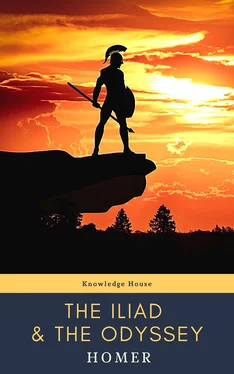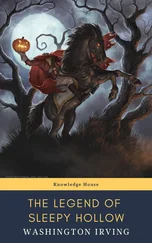Table of Contents
The Iliad & The Odyssey
Homer
Part 1 The Iliad Part 1 The Iliad
Book I
Book II
Book III
Book IV
Book V
Book VI
Book VII
Book VIII
Book IX
Book X
Book XI
Book XII
Book XIII
Book XIV
Book XV
Book XVI
Book XVII
Book XVIII
Book XIX
Book XX
Book XXI
Book XXII
Book XXIII
Book XXIV
Part 2 The Odyssey
Book I
Book II
Book III
Book IV
Book V
Book VI
Book VII
Book VIII
Book IX
Book X
Book XI
Book XII
Book XIII
Book XIV
Book XV
Book XVI
Book XVII
Book XVIII
Book XIX
Book XX
Book XXI
Book XXII
Book XXIII
Book XXIV
The Iliad & The Odyssey
Homer
(Translator: Samuel Butler)
Published:-800 Categorie(s):Fiction, Poetry, Fairy Tales, Folk Tales & Mythology
Part 1 The Iliad
Sing, O goddess, the anger of Achilles son of Peleus, that brought countless ills upon the Achaeans. Many a brave soul did it send hurrying down to Hades, and many a hero did it yield a prey to dogs and vultures, for so were the counsels of Jove fulfilled from the day on which the son of Atreus, king of men, and great Achilles, first fell out with one another.
And which of the gods was it that set them on to quarrel? It was the son of Jove and Leto; for he was angry with the king and sent a pestilence upon the host to plague the people, because the son of Atreus had dishonoured Chryses his priest. Now Chryses had come to the ships of the Achaeans to free his daughter, and had brought with him a great ransom: moreover he bore in his hand the sceptre of Apollo wreathed with a suppliant’s wreath and he besought the Achaeans, but most of all the two sons of Atreus, who were their chiefs.
“Sons of Atreus,” he cried, “and all other Achaeans, may the gods who dwell in Olympus grant you to sack the city of Priam, and to reach your homes in safety; but free my daughter, and accept a ransom for her, in reverence to Apollo, son of Jove.”
On this the rest of the Achaeans with one voice were for respecting the priest and taking the ransom that he offered; but not so Agamemnon, who spoke fiercely to him and sent him roughly away. “Old man,” said he, “let me not find you tarrying about our ships, nor yet coming hereafter. Your sceptre of the god and your wreath shall profit you nothing. I will not free her. She shall grow old in my house at Argos far from her own home, busying herself with her loom and visiting my couch; so go, and do not provoke me or it shall be the worse for you.”
The old man feared him and obeyed. Not a word he spoke, but went by the shore of the sounding sea and prayed apart to King Apollo whom lovely Leto had borne. “Hear me,” he cried, “O god of the silver bow, that protectest Chryse and holy Cilla and rulest Tenedos with thy might, hear me oh thou of Sminthe. If I have ever decked your temple with garlands, or burned your thigh-bones in fat of bulls or goats, grant my prayer, and let your arrows avenge these my tears upon the Danaans.”
Thus did he pray, and Apollo heard his prayer. He came down furious from the summits of Olympus, with his bow and his quiver upon his shoulder, and the arrows rattled on his back with the rage that trembled within him. He sat himself down away from the ships with a face as dark as night, and his silver bow rang death as he shot his arrow in the midst of them. First he smote their mules and their hounds, but presently he aimed his shafts at the people themselves, and all day long the pyres of the dead were burning.
For nine whole days he shot his arrows among the people, but upon the tenth day Achilles called them in assembly—moved thereto by Juno, who saw the Achaeans in their death-throes and had compassion upon them. Then, when they were got together, he rose and spoke among them.
“Son of Atreus,” said he, “I deem that we should now turn roving home if we would escape destruction, for we are being cut down by war and pestilence at once. Let us ask some priest or prophet, or some reader of dreams (for dreams, too, are of Jove) who can tell us why Phoebus Apollo is so angry, and say whether it is for some vow that we have broken, or hecatomb that we have not offered, and whether he will accept the savour of lambs and goats without blemish, so as to take away the plague from us.”
With these words he sat down, and Calchas son of Thestor, wisest of augurs, who knew things past present and to come, rose to speak. He it was who had guided the Achaeans with their fleet to Ilius, through the prophesyings with which Phoebus Apollo had inspired him. With all sincerity and goodwill he addressed them thus:—
“Achilles, loved of heaven, you bid me tell you about the anger of King Apollo, I will therefore do so; but consider first and swear that you will stand by me heartily in word and deed, for I know that I shall offend one who rules the Argives with might, to whom all the Achaeans are in subjection. A plain man cannot stand against the anger of a king, who if he swallow his displeasure now, will yet nurse revenge till he has wreaked it. Consider, therefore, whether or no you will protect me.”
And Achilles answered, “Fear not, but speak as it is borne in upon you from heaven, for by Apollo, Calchas, to whom you pray, and whose oracles you reveal to us, not a Danaan at our ships shall lay his hand upon you, while I yet live to look upon the face of the earth—no, not though you name Agamemnon himself, who is by far the foremost of the Achaeans.”
Thereon the seer spoke boldly. “The god,” he said, “is angry neither about vow nor hecatomb, but for his priest’s sake, whom Agamemnon has dishonoured, in that he would not free his daughter nor take a ransom for her; therefore has he sent these evils upon us, and will yet send others. He will not deliver the Danaans from this pestilence till Agamemnon has restored the girl without fee or ransom to her father, and has sent a holy hecatomb to Chryse. Thus we may perhaps appease him.”
With these words he sat down, and Agamemnon rose in anger. His heart was black with rage, and his eyes flashed fire as he scowled on Calchas and said, “Seer of evil, you never yet prophesied smooth things concerning me, but have ever loved to foretell that which was evil. You have brought me neither comfort nor performance; and now you come seeing among Danaans, and saying that Apollo has plagued us because I would not take a ransom for this girl, the daughter of Chryses. I have set my heart on keeping her in my own house, for I love her better even than my own wife Clytemnestra, whose peer she is alike in form and feature, in understanding and accomplishments. Still I will give her up if I must, for I would have the people live, not die; but you must find me a prize instead, or I alone among the Argives shall be without one. This is not well; for you behold, all of you, that my prize is to go elsewhither.”
And Achilles answered, “Most noble son of Atreus, covetous beyond all mankind, how shall the Achaeans find you another prize? We have no common store from which to take one. Those we took from the cities have been awarded; we cannot disallow the awards that have been made already. Give this girl, therefore, to the god, and if ever Jove grants us to sack the city of Troy we will requite you three and fourfold.”
Then Agamemnon said, “Achilles, valiant though you be, you shall not thus outwit me. You shall not overreach and you shall not persuade me. Are you to keep your own prize, while I sit tamely under my loss and give up the girl at your bidding? Let the Achaeans find me a prize in fair exchange to my liking, or I will come and take your own, or that of Ajax or of Ulysses; and he to whomsoever I may come shall rue my coming. But of this we will take thought hereafter; for the present, let us draw a ship into the sea, and find a crew for her expressly; let us put a hecatomb on board, and let us send Chryseis also; further, let some chief man among us be in command, either Ajax, or Idomeneus, or yourself, son of Peleus, mighty warrior that you are, that we may offer sacrifice and appease the the anger of the god.”
Читать дальше












